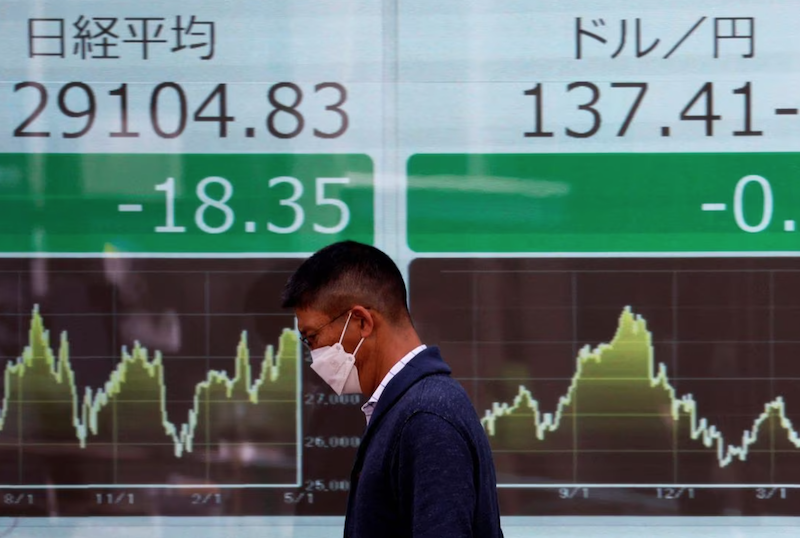Asian stocks rallied on Thursday with positive news on US inflation lifting the air of gloom on trading floors.
Data showing underlying US inflation remained on a slow, downward trajectory, despite a small upside surprise, cemented expectation that the Federal Reserve would leave interest rates unchanged next week, pushing indexes higher.
And an EU probe into Chinese state subsidies for its electric vehicle makers had little impact on China’s markets where there were gains too.
Japan’s Nikkei share average jumped to a one-week closing high with bets on the Federal Reserve leaving interest rates unchanged next week, fuelling a rally.
Also on AF: US, Euro Firms Switch Investment Focus From China to India
The Nikkei index rose 1.41% to 33,168.10, posting its highest close since September 6 and sharpest daily gain since August 28. The broader Topix rose 1.13% to 2,405.57.
But with domestic inflation exceeding the Bank of Japan’s 2% target for more than a year, market players are bracing for changes in the central bank’s ultra-loose monetary policy. The BoJ is scheduled to hold a two-day policy meeting next week.
China and Hong Kong stocks made some progress, as the European Union’s anti-subsidy probe barely affected China’s auto stocks, while investors continued to seek policy measures and signs of economic recovery.
China’s automobiles index was down as much as 2.0% in early trades but pared losses quickly and was down just 0.3% by the lunch break, though EV maker BYD, which has sales exposure in Europe, slid 3.1%.
The Shanghai Composite Index rose 0.11%, or 3.48 points, to 3,126.55, while the Shenzhen Composite Index on China’s second exchange dropped 0.64%, or 12.43 points, to 1,917.02.
Mainland property developers traded in Hong Kong were down 1.9% but the benchmark Hang Seng Index gained 0.21%, or 38.70 points, to close at 18,047.92.
Fuel Prices Drive US Inflation
Elsewhere across the region, in earlier trade, Seoul and Taipei were ahead, while Sydney, Singapore, Mumbai, Manila, Bangkok and Jakarta were also in the green.
MSCI’s broadest index of Asia-Pacific shares outside Japan rose 0.6% for its best session in a week and a half.
Wednesday’s US data showed higher fuel prices had lifted headline consumer prices by the most in 14 months in August for an annual rate of 3.7%, which was a touch above expectations. Core inflation, though, slowed to an annual 4.3%, as expected.
Treasury yields initially spiked higher, as did the US dollar, before both retraced their moves.
Benchmark 10-year Treasury yields finished the New York session a bit more than a basis point (bp) lower and fell by a further two bps in Asia to 4.23%. Two-year yields spiked above 5%, but were last at 4.96%.
Thursday’s European Central Bank meeting is next on the horizon, with markets pricing about a 65% chance of a hike that takes Europe’s key interest rate to a record peak.
Yen Hands Back Gains
In foreign exchange markets, the dollar was slightly sold, and the Australian dollar was boosted by a surge in employment in August. It was last about 0.2% higher at $0.6435, though interest rate expectations were little changed.
The New Zealand dollar was also firmer at $0.5929, while the dollar slipped about 0.2% to buy 147.13 yen.
The yen has mostly handed back gains made after Bank of Japan Governor Kazuo Ueda hinted at the conditions for an end to negative short-term rates, as traders figure on any exit being slow and the gap with US rates remaining wide. China’s yuan was steady at 7.2747 per dollar.
In the US session on Thursday, chip designer Arm Holdings begins trading, after a $51-a-share float gave it a valuation of $54.5 billion. Retail sales data are also due.
In commodity markets oil is on a tear as Saudi Arabia and Russia extend production cuts to the end of 2023. Brent crude futures are up 30% in three months to $92.32 a barrel.
Gas markets were skittish as strikes began at production projects in Australia that account for more than 5% of global supply. On Wednesday benchmark European gas prices were up 6.5%.
Key figures
Tokyo – Nikkei 225 > UP 1.41% at 33,168.10 (close)
Hong Kong – Hang Seng Index > UP 0.21% at 18,047.92 (close)
Shanghai – Composite > UP 0.11% at 3,126.55 (close)
London – FTSE 100 > UP 0.26% at 7,545.72 (0934 BST)
New York – Dow < DOWN 0.20% at 34,575.53 (Wednesday close)
- Reuters with additional editing by Sean O’Meara
Read more:
Europe Assessing Tariffs on Chinese EVs Amid Subsidy Concerns
China Central Bank Seen Boosting Liquidity, Keeping Rates Steady
Shanghai Exchange Looking at Nickel Futures, May Rival LME
Nikkei Dips on Fed Fears, Hang Seng Flat on China Worries
























